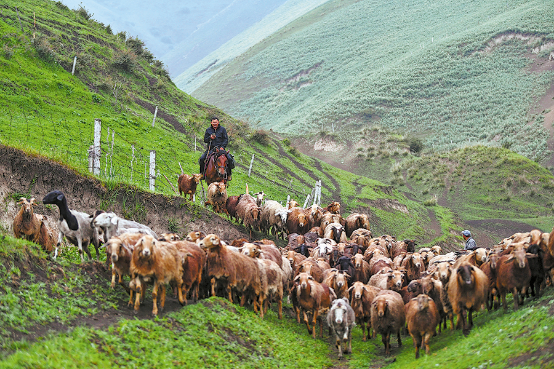
In Xinjiang, China, herders like Balatijan Eremubai still follow an old tradition: moving livestock (牲畜) to higher pastures (牧场) every summer. But today, this journey blends old ways with new ideas.
原创编写 版权所有 侵权必究! 每日更新 个性化阅读 英语飙升!
1.1. What do herders in Xinjiang do every summer?
A Move livestock.
B Move to towns.
C Plant crops.
D Build houses.
解析:选A。A 细节理解题。根据第一段中的“In Xinjiang, China, herders like Balatijan Eremubai still follow an old tradition: moving livestock to higher pastures every summer.”可知,新疆的牧民每年夏天会把牲畜转移到海拔更高的牧场。故选A。
2.2. What makes their move easier?
A Their large family.
B Modern vehicles.
C Good weather.
D High mountains.
解析:选B。B 推理判断题。第二段明确提到“Trucks help us move heavy stuff faster”和“Motor vehicles make setting up home much easier!”,即卡车等现代交通工具帮助巴拉提江一家更快搬运重物、更轻松安家。故选B。
3.3. Why does the writer mention “Rain and sun change quickly” in Paragraph 3?
A To show the time.
B To describe the road.
C To explain the danger.
D To tell the difficulty.
解析:选D。D 推理判断题。第三段中提到“Rain and sun change quickly, but he stays strong. ‘It’s tiring, but it’s our life,’ he says.”,作者提及天气变化无常,是为了体现巴拉提江引导羊群的过程很艰难,突出这份工作的辛苦,所以提到“雨和太阳变化快”是为了说明困难。故选D。
4.4. What benefit do elderly people get from the changes in Xinjiang?
A Free sheep.
B Easier healthcare.
C New yurts.
D Faster horses.
解析:选B。B 细节理解题。根据第四段的“Elderly people can get healthcare easily.”可知,新疆的变化让老年人能够更便捷地获得医疗服务。故选B。
5.5. What can we know from the last paragraph?
A Balatijan’s sadness.
B Balatijan’s worry.
C Balatijan’s satisfaction.
D Balatijan’s surprise.
解析:选C。C 推理判断题。最后一段巴拉提江说“We keep our way of life, but also welcome good changes”,说明他对这种既保留传统生活方式,又有良好改变的现状感到满意。故选C。